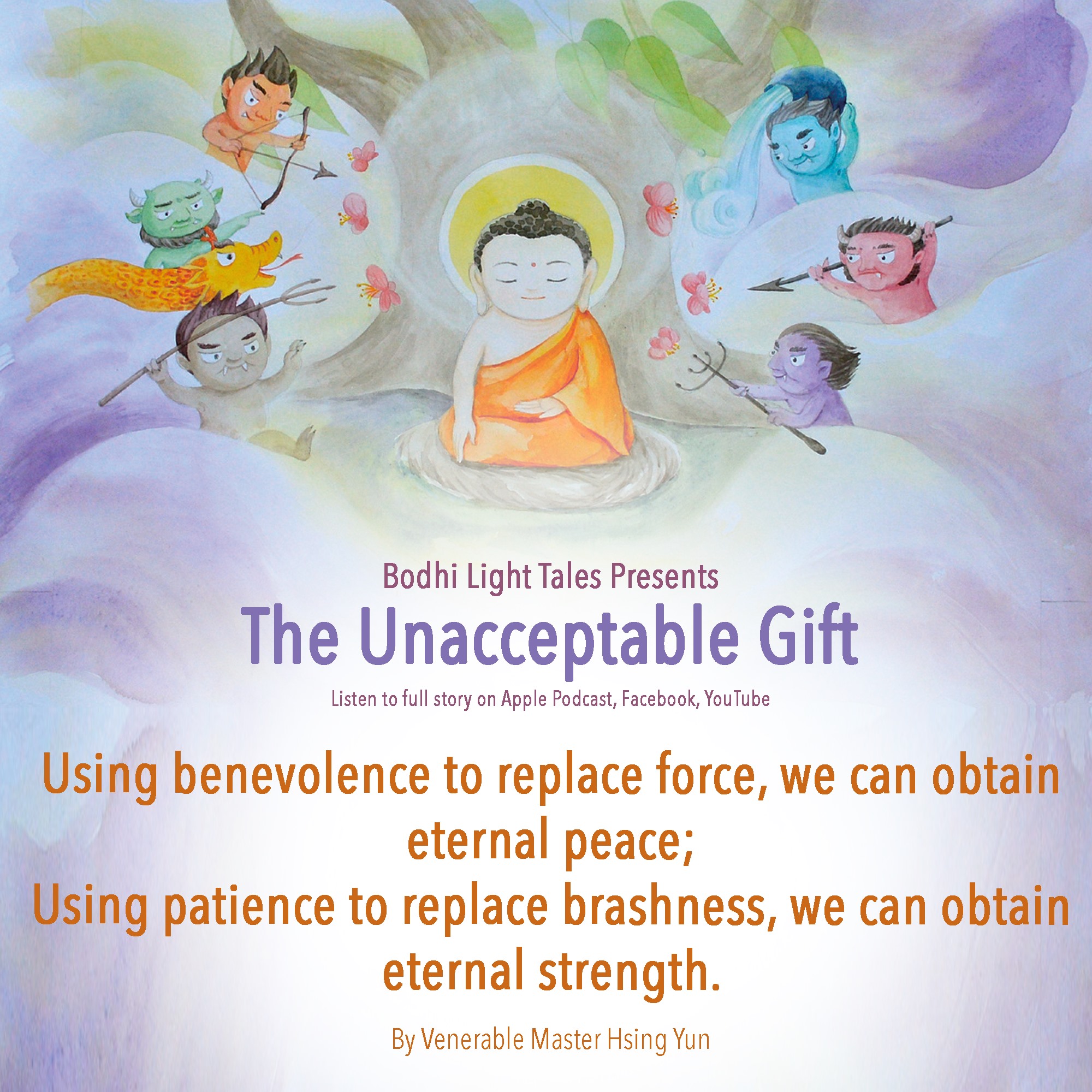Humble Table, Wise Fare
Keep set hours for going to bed and waking up in the morning. Eat the same amount of food for your three meals each day.
News
The Unacceptable Gift
Find out what happened in this podcast episode : https://bit.ly/3sxwiVc
Once upon a time, there lived a Brahmin named Akkosa Bharadvaja. A Brahmin is a member of the highest caste in Hinduism.
One day, Bharadvaja found out his cousin had also decided to renounce and follow the Buddha. He thought, “Not another one?! Why are all my friends and relatives deciding to follow the Buddha one after the other?”
Feeling angry, the Brahmin rushed to Venuvana Vihara in Rajagrha, where the Buddha was staying. When he arrived, he approached the Buddha, and without even greeting him, said, “You practice witchcraft. You have put my family under a spell, forcing them to believe in you. Otherwise, why would they all decide to renounce and follow you?!”
The Buddha did not respond, simply sitting quietly.
The Brahmin continued to curse at the Buddha using bad words and foul language.
But the Buddha remained unmoved. He simply waited and listened to the Brahmin until he was done.
Seeing that the Buddha did not react to his accusations, the Brahmin finally stopped speaking and stared at the Buddha.
The Buddha then calmly replied, “Brahmin, imagine that you visit your friends at their house, and you bring gifts for them. But, when you offer the gifts to your friends, they refuse to accept them. What would you do then?”
The Brahmin replied, “At first, I will insist that they accept. But if they still refuse to accept my gifts, then I can only bring the gifts back home with me.”
The Buddha looked straight at the Brahmin and said, “Today, you come to see me with such harsh words, and so I refuse to accept them. Therefore, everything you have said still belongs to you. Just like the gifts you tried to offer to your friends, I refuse to accept them as well.”
The Buddha’s words pierced through the Brahmin’s ignorance like a bolt of lightning. He realized what he had done and regretted his actions. Before leaving the vihara, the Brahmin joined his palms, paid respect to the Buddha, and said, “Thank you for this most important lesson.”
This story demonstrates the Buddha’s skillful means of dealing with criticism and disagreements. The Buddha understood that if a dispute is used to try to resolve a disagreement, it will only escalate the situation and increase enmity. It definitely cannot transform a deluded mind, nor cease criticism and opinions. Only a person with great forbearance can guide stubborn sentient beings, and strive for peace.
The Collection of Advice to Initiate the Bodhi Mind states that, “The great strength of forbearance can break defilements.” The sixth patriarch Huineng also promoted that, “With patience, no bad can take effect.” The strength of patience can tame all evils in the world. It is a form of daily life practice and cultivation for all practitioners.
The Sutra on the Buddha's Bequeathed Teachings states that, “One who practices patience is truly a person with great strength.” Forbearance means to treat everyone with a heart of compassion and handle affairs with a mind of wisdom. Forbearance does not mean to repress oneself blindly, or weaken, or cower. Instead, it means to give ourselves and others freedom and personal space. It is a form of nourishment that we accumulate through gaining experience, virtue, and merit, and having the courage to accept responsibility. It is not about fighting for the sake of fighting, but to fight for great causes that last for thousands of years. In other words, the focus is on striving for long-term positive achievement rather than a single moment of personal satisfaction. Therefore, forbearance is a form of success, like building a successful career. It is a way of treating others and handling affairs without discrimination. As ancient sages often advised and encouraged, “Take a step back and the world becomes as boundless as the sea and the sky.” If we can remain steady through the ups and downs of life, face all matters with a calm and steady mind as well as a compassionate attitude, then we shall truly live a life of freedom.
Just as Venerable Master Hsing Yun says,
“Using benevolence to replace force, we can obtain eternal peace;
Using patience to replace brashness, we can obtain eternal strength.”
OTHER LINKS:
OTHER LINKS:





